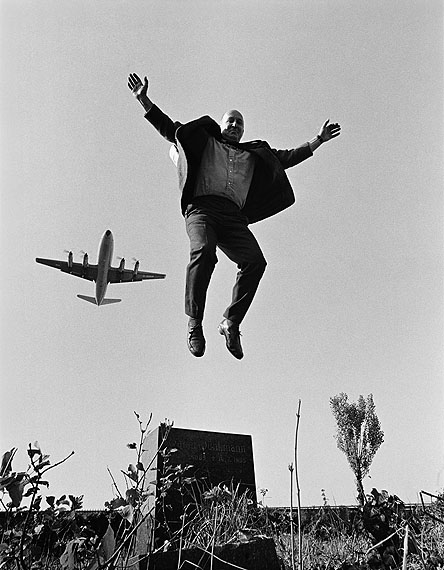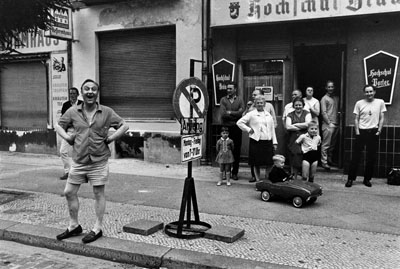
Michael Ruetz »
Eye on Life
Die unbequeme Zeit
Exhibition: 29 Oct – 4 Dec 2010
Johanna Breede
Fasanenstr. 69
10719 Berlin
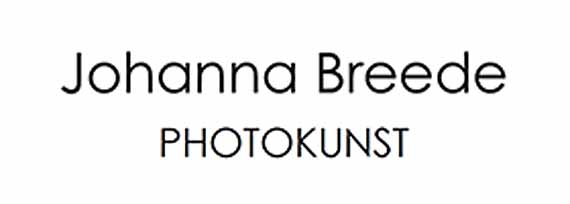
Johanna Breede PHOTOKUNST
Fasanenstr. 69
10719 Berlin
+49 (0)30-88913590
photokunst@breede.de
www.johanna-breede.com
Tue-Fri 11-17, Sat 11-14
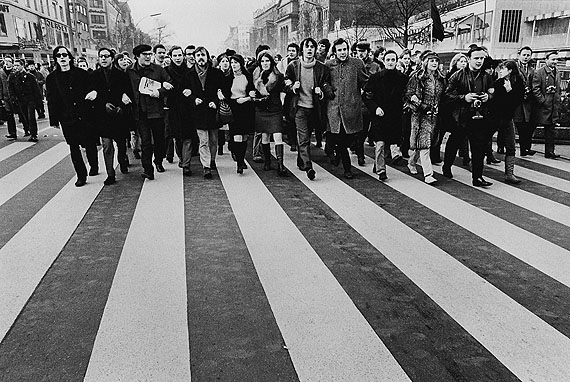
The pictures of political demonstrations and from student communes in Berlin by Michael Ruetz have become a permanent element of German memory culture; hardly any conversation about the events of that time can do without a reference to these photographs – they have been stamped, like coins, into the memory. But for Ruetz himself these pictures were not imaginable without the other ones, there were no student demonstrations without the bourgeois daily life out of which these had sprung, no critical university without cramming in knowledge in seminars or libraries, no new type of self-realization without practise in living together beyond the given convention. Above all there was no West Berlin freedom without the niche society in the GDR in the eastern part of the city, where they also had their freedoms, but far below the threshold of what was demonstratively displayed. Where wallowing in memories has become the embarrassing habit of a long-since outmoded outlook on life – the airspace above the regular clientele itself crying out over the loss of the pub that no longer exists thanks to the ban on smoking – the spectrum of the memory captured in pictures can develop almost therapeutic energy. Life around 1968 was far richer than the childlike and childish manifestations of the activists led us to assume. Michael Ruetz was witness to the entire historical process, not only to the one partial aspect that made him famous – this is the case at least with his native city Berlin and the whole of Germany in those years.
Rolf Sachsse
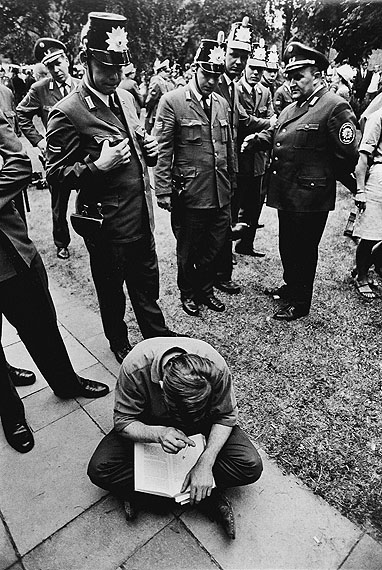
Die Bilder von politischen Demonstrationen und aus studentischen Wohngemeinschaften in Berlin von Michael Ruetz sind fester Bestandteil deutscher Erinnerungskultur geworden; kaum ein Gespräch über die Vorgänge jener Zeit kommt ohne einen Verweis auf die Bilder aus – sie haben, Münzen gleich, das Gedächtnis geprägt. Doch für ihn selbst waren diese Bilder nicht ohne andere zu haben, gab es keine studentische Demonstration ohne den bürgerlichen Alltag, dem diese entsprungen war, keine kritische Universität ohne den Wissensspeicher in Seminaren und Bibliotheken, keine neuartige Selbstverwirklichung ohne die Einübung ins gemeinsame Leben jenseits der vorgegebenen Konventionen. Vor allem gab es keine Westberliner Freiheit ohne die Nischengesellschaft der DDR im Osten der Stadt, die auch ihre Freiheiten hatte, aber eben weit unterhalb der Schwelle des demonstrativ Vorgeführten. Wo das Schwelgen in Erinnerung zur peinlichen Praxis längst überholter Weltsicht wird, als Luftraum über dem Stammtisch selbst noch der Kneipe nachweisen muss, die es dank Rauchverbot nicht mehr gibt, kann die Bandbreite des in Bilder gefassten Gedächtnisses geradezu therapeutische Kräfte entwickeln: Das Leben um 1968 war viel reicher, als es die kindlichen wie kindischen Manifestationen der Aktivisten vermuten ließ. Michael Ruetz ist Zeuge des gesamten historischen Prozesses, nicht nur des einen kleinen Teilaspekts, der ihn berühmt gemacht hat – mindestens gilt dies für seine Heimatstadt Berlin und das ganze Deutschland jener Jahre.
Rolf Sachsse
